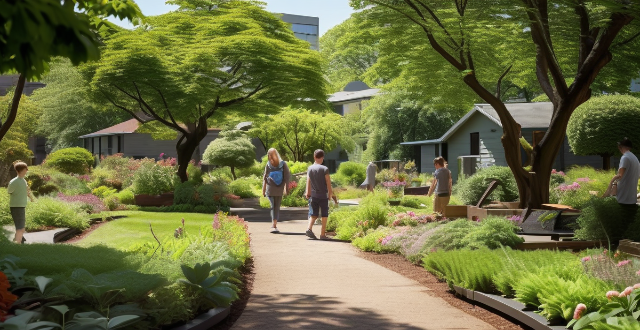Improvement Greening

What are the benefits of urban greening projects ?
Urban greening projects offer a multitude of benefits including improved air quality, climate regulation, water management, enhanced aesthetics and livability, mental and physical health improvements, community building, habitat creation and preservation, food production, job creation, energy conservation, and tourism attraction. These initiatives aim to increase the amount of greenery in cities, such as parks, gardens, green roofs, walls, street trees, and other forms of urban forestry. The advantages of urban greening are multifaceted and contribute significantly to the improvement of urban environments for both residents and wildlife.

How do urban greening projects affect biodiversity in cities ?
Urban greening projects, which aim to increase the amount of vegetation within cities, can have significant effects on urban biodiversity. These projects typically involve planting trees, creating parks and green spaces, and restoring natural habitats. Here are some ways in which these initiatives can influence the variety of species living in urban areas: - Increased Habitat Availability: By adding more greenery, urban greening provides additional habitats for a wide range of organisms. This includes plants, insects, birds, and small mammals that can thrive in these newly created environments. - Mitigation of Urban Heat Islands: Vegetation helps reduce the urban heat island effect by providing shade and releasing water through transpiration, creating cooler microclimates that are more suitable for certain species. - Enhanced Food Sources: Flowering plants attract pollinators like bees and butterflies, supporting their populations and contributing to the health of the overall ecosystem. - Increased Water Quality and Availability: Green roofs and rain gardens help manage stormwater runoff, reducing pollution and providing water sources for urban wildlife. - Promotion of Biodiversity through Education and Awareness: Parks and green spaces serve as outdoor classrooms, offering opportunities for education about ecology and conservation. While urban greening projects offer numerous benefits for biodiversity, they also present challenges such as potential introduction of invasive species, maintenance requirements, and resource allocation trade-offs with other land uses.

How do urban greening projects influence city temperatures and heat islands ?
Urban greening projects, such as planting trees and creating parks, can help reduce city temperatures and mitigate the effects of urban heat islands. These projects provide shade, reduce heat absorption by buildings and roads, and promote evapotranspiration, all of which contribute to cooler city environments. By increasing vegetation in cities, urban greening initiatives can also help reduce the intensity of urban heat islands, making cities more comfortable for residents. As our world continues to urbanize, prioritizing urban greening initiatives is essential for creating healthier and more sustainable cities for future generations.

What role do community gardens play in city greening efforts ?
Community gardens play a significant role in city greening efforts by providing environmental, social, economic, and urban planning benefits. These gardens improve air quality, enhance biodiversity, and promote soil health. They also foster community building, offer educational opportunities, and contribute to health promotion. Economically, community gardens provide food security and create job opportunities. Integrated into urban planning, they beautify cities and promote sustainable development. Overall, community gardens are vital for ecological health and improving residents' quality of life.

How can cities encourage citizen participation in greening projects ?
This article discusses various strategies that cities can adopt to encourage citizen participation in greening projects, including education and awareness, volunteer opportunities, incentives and recognition, and collaboration with local organizations. By implementing these strategies, cities can create vibrant, sustainable environments that benefit both residents and the planet.

What challenges do urban planners face when implementing greening projects ?
Urban planners face numerous challenges when implementing greening projects in cities, including a lack of available space, high costs, resistance from stakeholders, climate change impacts, and maintenance and management issues.

How do city greening projects contribute to environmental sustainability ?
City greening projects are vital for environmental sustainability, addressing issues like heat island effects, air quality, biodiversity, and more. They beautify urban landscapes, contribute to sustainable living, and offer economic benefits. Key considerations include diverse planting, maintenance, and community involvement.

How do green roofs and walls contribute to city greening ?
Green roofs and walls contribute to city greening by improving air quality, mitigating the urban heat island effect, enhancing biodiversity, managing stormwater, increasing energy efficiency, providing aesthetic value, and promoting community well-being.

How can data analytics help identify areas for energy efficiency improvements in industry ?
Data analytics is crucial for identifying opportunities for energy efficiency improvements in industry. It enables real-time and historical monitoring, benchmarking, process optimization, predictive maintenance, and demand response management. These insights help companies reduce energy waste, cut costs, and minimize environmental impact.

How can I improve my self-evaluation skills in the workplace ?
Self-evaluation is a crucial skill in the workplace, allowing you to reflect on performance and set goals for improvement. To enhance this skill, set clear SMART goals, track progress, seek feedback, remain objective, reflect on experiences, celebrate successes, identify areas for improvement, and stay open to change. This process should be ongoing, with regular practice leading to greater success over time.

How often should I practice to see improvement in my golf skills ?
Golf improvement requires consistent practice, and the frequencyGolf improvement requires consistent practice, and the frequency your skill level, goals, and the frequency of your sessions depends on your skill level, goals, and availability. Assess your current skill level and set realistic goals to create a practice plan that includes both on-course and off-course activities. Beginners should aim for at least three practice sessions per week, while intermediates can do two to three and advanced players one or two. Make each session count by focusing on specific goals and tracking progress. Consistency is key, so stick to your practice plan and adjust it as needed based on your progress.

How often should I use a language learning app to see significant improvement ?
To see significant improvement with a language learning app, it's recommended to use the app daily for at least 10-15 minutes, setting weekly targets and focusing on consistency over intensity. Combining app use with real-world interactions and adjusting your routine based on progress tracking are also key strategies.

Can sports be used as a tool for personal growth and self-improvement ?
The text discusses the various ways in which sports can be used as a tool for personal growth and self-improvement. The author highlights the following aspects: - Mental toughness and resilience: Facing challenges and overcoming failure through sports can cultivate mental toughness and build resilience. - Teamwork and communication: Working together and effective communication are essential skills developed through team sports, which can enhance interpersonal relationships and group dynamics. - Discipline and time management: The structured approach required in sports can improve personal organization and time management skills, along with goal setting and strategic thinking. - Physical health and well-being: Sports contribute significantly to physical health by promoting fitness and endurance, and can also improve mental health by combating depression and anxiety. - Leadership and initiative: Sports provide opportunities for individuals to step up as leaders and develop problem-solving abilities, encouraging proactive behavior. - Self-confidence and self-esteem: Achieving mastery in sports can boost an athlete's confidence and self-esteem, fostering a positive self-image. - Adaptability and learning agility: Sports require athletes to adapt quickly to new tactics or game plans, encouraging a mindset of continuous learning that extends beyond the sporting realm. Overall, the text emphasizes that sports offer a comprehensive toolkit for personal development, encompassing benefits that extend far beyond the playing field. Engaging in sports can be a powerful catalyst for self-improvement and personal growth.

How long does it take to see improvements in cardiorespiratory fitness from starting an exercise routine ?
When starting an exercise routine to improve cardiorespiratory fitness, noticeable changes can occur within weeks, but significant and lasting improvements typically take several months of consistent training. Factors affecting improvement rates include baseline fitness level, workout frequency and intensity, age, health status, nutrition, recovery, and genetics. To maximize progress, set realistic goals, mix up your routine, monitor your progress, stay consistent, and get adequate rest.

Is there any improvement in the processor of the new iPhone model ?
The new iPhone model features a faster processor with improved performance, energy efficiency, graphics capabilities, and machine learning abilities.

What kind of customer feedback has been received so far for the new product ?
The new product has received mostly positive feedback, withThe new product has received mostly positive feedback, with user-friendly interface, speed However, there have been concerns about compatibility issues, software bugs, and pricing. Some customers also mentioned the need for additional features and improvements in customer support services. Overall, the feedback will be used to make necessary improvements and meet customer expectations.

Are there any specific exercises or drills for skill improvement in basketball/football/tennis, etc. ?
Topic: Skill Improvement Exercises and Drills in Basketball, Football, and Tennis Basketball: - Dribble the ball with alternating hands and in a figure 8 motion to improve ball handling skills. - Practice shooting free throws and spot shooting to enhance accuracy and consistency. - Work on lateral movement and closeout drills to improve defensive positioning and quickness. Football (Soccer): - Pass the ball against a wall and in a triangle formation to improve passing accuracy and touch. - Practice shooting at targets and receiving passes before shooting to enhance shooting accuracy and speed. - Work on marking and tackling drills to improve defensive skills and technique. Tennis: - Hit crosscourt groundstrokes and alternate forehand and backhand shots to improve accuracy and consistency. - Practice serving to targets and focusing on second serves to enhance serving reliability and placement. - Work on lateral movement and net approach drills to improve court coverage and net play.

In what ways do urban heat islands influence city planning and design ?
Urban heat islands, areas within cities that are significantly warmer than surrounding rural areas, have a significant impact on city planning and design. This phenomenon is primarily due to the concentration of buildings, pavements, and other infrastructure that absorb and retain heat. The impact of urban heat islands extends beyond just temperature differences, influencing various aspects of city planning and design. These include increased energy consumption, public health concerns, water management, green spaces and landscaping, transportation planning, building materials and construction techniques, community design and zoning, climate change adaptation, and public awareness and education. Addressing these challenges requires a multifaceted approach that considers energy efficiency, public health, water management, green spaces, transportation, building materials, community design, climate change adaptation, and public awareness. By taking these factors into account, cities can become more livable, sustainable, and resilient in the face of rising temperatures.

How can businesses incorporate sustainable practices into their operations ?
Businesses can adopt sustainable practices by conducting a sustainability assessment, implementing energy-efficient measures, reducing waste and promoting recycling, greening their supply chain, supporting environmental initiatives, and monitoring progress. These actions not only help reduce environmental impact but also enhance brand reputation and ensure long-term success.

What strategies are effective in maintaining and expanding urban green spaces ?
Strategies for maintaining and expanding urban green spaces include advocacy, policy implementation, funding allocation, community involvement, innovative design, collaboration, and monitoring. Efforts should focus on educating the public, engaging stakeholders, setting minimum standards, seeking grants, encouraging philanthropy, organizing volunteer programs, promoting community gardens, using native plants, fostering inter-agency cooperation, partnering with private sectors, conducting regular inspections, establishing performance metrics, and creating feedback mechanisms.

How long after starting an exercise routine can improvements in cognitive function be expected ?
The text discusses the timeline for improvements in cognitive function after starting an exercise routine. It mentions that immediate benefits such as enhanced mood, improved attention and focus, and increased energy levels can be noticed within 1-3 months. Mid-term benefits like enhanced memory retention, improved executive function, and increased creativity can be observed within 3-6 months. Long-term benefits such as slowed cognitive decline, reduced risk of cognitive disorders, and sustained improvements in overall cognitive performance can be achieved after six months or longer. The text emphasizes the importance of maintaining a consistent exercise regimen over the long term for sustained enhancements in various aspects of cognitive function.

How long after starting a new exercise routine can improvements in immunity be expected ?
Regular exercise has numerous health benefits, including improved cardiovascular health, weight management, and mental well-being. One of the lesser-known benefits is its positive impact on the immune system. Improvements in immunity can be observed within a few weeks of starting a regular exercise program, depending on individual factors such as current fitness level, intensity and duration of exercise sessions, and overall lifestyle habits. By incorporating regular physical activity into your daily routine, you can enhance your immune function and enjoy the numerous other health benefits associated with exercise.

What role do teachers play in promoting climate education ?
Teachers play a pivotal role in climate education by enhancing awareness, fostering critical thinking, encouraging ethical responsibility, and promoting active engagement among students. They achieve this through various methods including providing scientifically accurate information, facilitating understanding, stimulating inquiry, analyzing data, integrating sustainability principles, and designing practical projects. Furthermore, teachers prepare students for future challenges by highlighting climate-related careers and fostering lifelong learning about environmental issues. Overall, educators are instrumental in guiding students towards becoming informed citizens capable of addressing the complexities of climate change and contributing to a sustainable world.

How can governments promote the development of green finance in their countries ?
Governments can promote green finance by establishing policy frameworks, enhancing market infrastructure, investing public funds, educating stakeholders, and cooperating internationally.

How does climate change legislation address the concerns of environmental justice and equity ?
Climate change legislation should address environmental justice and equity by prioritizing vulnerable communities, promoting participatory decision-making, ensuring access to clean energy and sustainable practices, and addressing environmental health disparities. This will create more equitable and effective climate policies for all communities.